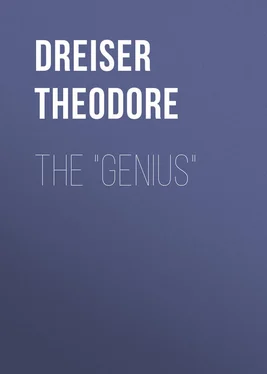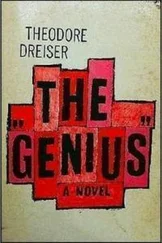Theodore Dreiser - The Genius
Здесь есть возможность читать онлайн «Theodore Dreiser - The Genius» — ознакомительный отрывок электронной книги совершенно бесплатно, а после прочтения отрывка купить полную версию. В некоторых случаях можно слушать аудио, скачать через торрент в формате fb2 и присутствует краткое содержание. Жанр: foreign_antique, foreign_prose, на английском языке. Описание произведения, (предисловие) а так же отзывы посетителей доступны на портале библиотеки ЛибКат.
- Название:The Genius
- Автор:
- Жанр:
- Год:неизвестен
- ISBN:нет данных
- Рейтинг книги:5 / 5. Голосов: 1
-
Избранное:Добавить в избранное
- Отзывы:
-
Ваша оценка:
- 100
- 1
- 2
- 3
- 4
- 5
The Genius: краткое содержание, описание и аннотация
Предлагаем к чтению аннотацию, описание, краткое содержание или предисловие (зависит от того, что написал сам автор книги «The Genius»). Если вы не нашли необходимую информацию о книге — напишите в комментариях, мы постараемся отыскать её.
The Genius — читать онлайн ознакомительный отрывок
Ниже представлен текст книги, разбитый по страницам. Система сохранения места последней прочитанной страницы, позволяет с удобством читать онлайн бесплатно книгу «The Genius», без необходимости каждый раз заново искать на чём Вы остановились. Поставьте закладку, и сможете в любой момент перейти на страницу, на которой закончили чтение.
Интервал:
Закладка:
The Sunday Eugene called, it rained and the neighborhood in which she lived was exceedingly dreary. Looking around here and there one could see in the open spaces between the houses pools of water standing in the brown, dead grass. He had crossed a great maze of black cindered car tracks, where engines and cars were in great masses, and speculated on the drawings such scenes would make – big black engines throwing up clouds of smoke and steam in a grey, wet air; great mazes of parti-colored cars dank in the rain but lovely. At night the switch lights in these great masses of yards bloomed like flowers. He loved the sheer yellows, reds, greens, blues, that burned like eyes. Here was the stuff that touched him magnificently, and somehow he was glad that this raw flowering girl lived near something like this.
When he reached the door and rang the bell he was greeted by an old shaky Irish-American who seemed to him rather low in the scale of intelligence – the kind of a man who would make a good crossing guard, perhaps. He had on common, characterful clothes, the kind that from long wear have taken the natural outlines of the body. In his fingers was a short pipe which he had been smoking.
"Is Miss Kenny in?" Eugene inquired.
"Yus," said the man. "Come in. I'll git her." He poked back through a typical workingman's parlor to a rear room. Someone had seen to it that almost everything in the room was red – the big silk-shaded lamp, the family album, the carpet and the red flowered wall paper.
While he was waiting he opened the album and looked at what he supposed were her relatives – commonplace people, all – clerks, salesmen, store-keepers. Presently Ruby came, and then his eye lighted, for there was about her a smartness of youth – she was not more than nineteen – which captivated his fancy. She had on a black cashmere dress with touches of red velvet at the neck and elsewhere, and she wore a loose red tie, much as a boy might. She looked gay and cheerful and held out her hand.
"Did you have much trouble in getting here?" she asked.
He shook his head. "I know this country pretty well. I collect all through here week days. I work for the Peoples' Furniture Company, you know."
"Oh, then it's all right," she said, enjoying his frankness. "I thought you'd have a hard time finding it. It's a pretty bad day, isn't it?"
Eugene admitted that it was, but commented on the car tracks he had seen. "If I could paint at all I'd like to paint those things. They're so big and wonderful."
He went to the window and gazed out at the neighborhood.
Ruby watched him with interest. His movements were pleasing to her. She felt at home in his company – as though she were going to like him very much. It was so easy to talk to him. There were the classes, her studio work, his own career, this neighborhood, to give her a feeling of congeniality with him.
"Are there many big studios in Chicago?" he asked when they finally got around to that phase of her work. He was curious to know what the art life of the city was.
"No, not so very many – not, at least, of the good ones. There are a lot of fellows who think they can paint."
"Who are the big ones?" he asked.
"Well, I only know by what I hear artists say. Mr. Rose is pretty good. Byam Jones is pretty fine on genre subjects, so they say. Walter Low is a good portrait painter, and so is Manson Steele. And let's see – there's Arthur Biggs – he does landscapes only; I've never been in his studio; and Finley Wood, he's another portrait man; and Wilson Brooks, he does figures – Oh! I don't know, there are quite a number."
Eugene listened entranced. This patter of art matters was more in the way of definite information about personalities than he had heard during all the time he had been in the city. The girl knew these things. She was in the movement. He wondered what her relationship to these various people was?
He got up after a time and looked out of the window again. She came also. "It's not very nice around here," she explained, "but papa and mamma like to live here. It's near papa's work."
"Was that your father I met at the door?"
"They're not my real parents," she explained. "I'm an adopted child. They're just like real parents to me, though, I certainly owe them a lot."
"You can't have been posing in art very long," said Eugene thoughtfully, thinking of her age.
"No; I only began about a year ago."
She told how she had been a clerk in The Fair and how she and another girl had got the idea from seeing articles in the Sunday papers. There was once a picture in the Tribune of a model posing in the nude before the local life class. This had taken her eye and she had consulted with the other girl as to whether they had not better try posing, too. Her friend, like herself, was still posing. She was coming to the dinner.
Eugene listened entranced. It reminded him of how he was caught by the picture of Goose Island in the Chicago River, of the little tumble-down huts and upturned hulls of boats used for homes. He told her of that and of how he came, and it touched her fancy. She thought he was sentimental but nice – and then he was big, too, and she was so much smaller.
"You play?" he asked, "don't you?"
"Oh, just a little. But we haven't got a piano. I learned what I know by practising at the different studios."
"Do you dance?" asked Eugene.
"Yes, indeed," she replied.
"I wish I did," he commented ruefully.
"Why don't you? It's easy. You could learn in no time. I could teach you in a lesson."
"I wish you would," he said persuasively.
"It isn't hard," she went on, moving away from him. "I can show you the steps. They always begin with the waltz."
She lifted her skirts and exposed her little feet. She explained what to do and how to do it. He tried it alone, but failed; so she got him to put his arm around her and placed her hand in his. "Now, follow me," she said.
It was so delightful to find her in his arms! And she was apparently in no hurry to conclude the lesson, for she worked with him quite patiently, explaining the steps, stopping and correcting him, laughing at her mistakes and his. "You're getting it, though," she said, after they had turned around a few times.
They had looked into each other's eyes a number of times and she gave him frank smiles in return for his. He thought of the time when she stood by him in the studio, looking over his shoulder. Surely, surely this gap of formalities might be bridged over at once if he tried if he had the courage. He pulled her a little closer and when they stopped he did not let go.
"You're mighty sweet to me," he said with an effort.
"No, I'm just good natured," she laughed, not endeavoring to break away.
He became emotionally tense, as always.
She rather liked what seemed the superiority of his mood. It was different, stronger than was customary in the men she knew.
"Do you like me?" he asked, looking at her.
She studied his face and hair and eyes.
"I don't know," she returned calmly.
"Are you sure you don't?"
There was another pause in which she looked almost mockingly at him and then, sobering, away at the hall door.
"Yes, I think I do," she said.
He picked her up in his arms. "You're as cute as a doll," he said and carried her to the red settee. She spent the rest of the rainy afternoon resting in his arms and enjoying his kisses. He was a new and peculiar kind of boy.
CHAPTER XI
A little while before, Angela Blue at Eugene's earnest solicitation had paid her first Fall visit to Chicago. She had made a special effort to come, lured by a certain poignancy of expression which he could give to any thought, particularly when it concerned his desires. In addition to the art of drawing he had the gift of writing – very slow in its development from a structural and interpretative point of view, but powerful already on its descriptive side. He could describe anything, people, houses, horses, dogs, landscapes, much as he could draw them and give a sense of tenderness and pathos in the bargain which was moving. He could describe city scenes and the personal atmosphere which surrounded him in the most alluring fashion. He had little time to write, but he took it in this instance to tell this girl what he was doing and how he was doing it. She was captivated by the quality of the world in which he was moving, and the distinction of his own personality, which he indicated rather indirectly than otherwise. By contrast her own little world began to look very shabby indeed.
Читать дальшеИнтервал:
Закладка:
Похожие книги на «The Genius»
Представляем Вашему вниманию похожие книги на «The Genius» списком для выбора. Мы отобрали схожую по названию и смыслу литературу в надежде предоставить читателям больше вариантов отыскать новые, интересные, ещё непрочитанные произведения.
Обсуждение, отзывы о книге «The Genius» и просто собственные мнения читателей. Оставьте ваши комментарии, напишите, что Вы думаете о произведении, его смысле или главных героях. Укажите что конкретно понравилось, а что нет, и почему Вы так считаете.








